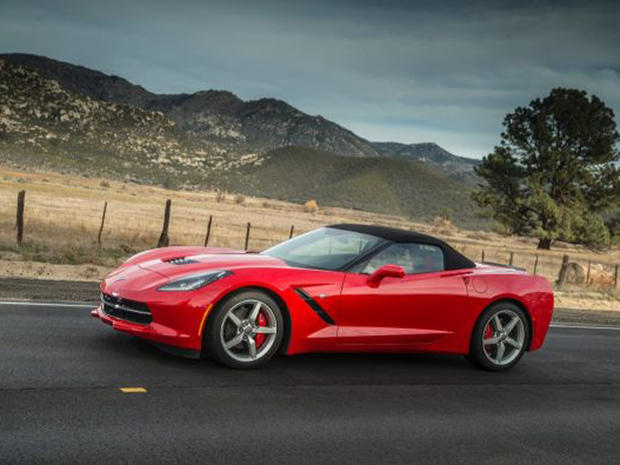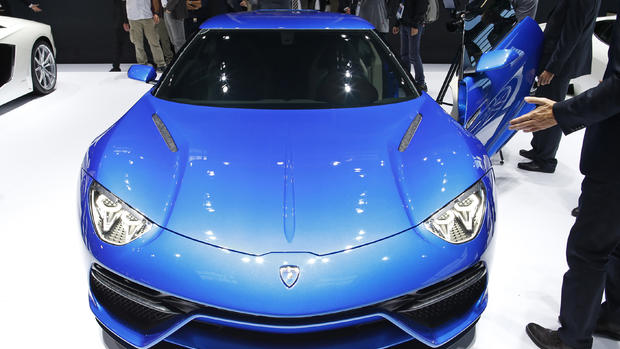How a "connected" car could save you money
Technology which connects your car to traffic signals will help consumers avoid accidents, reduce fuel consumption and delays during their daily commutes.
This technology means consumers could be spending less money in the future since less gasoline will be used and auto insurance rates could drop with fewer accidents occurring.
Connected vehicle technology integrates traffic management and is now part of many drivers' everyday lives. Studies conducted by the U.S. Department of Transportation indicate that 83 percent of crashes will be avoided through the use of connected vehicle technology.
Intersections containing the technology can move traffic along more efficiently -- delays are estimated to be lowered by 17 percent, the number of times a driver needs to stop is lowered by 22 percent, the amount of gasoline used falls by 5 percent and C02 emissions get eliminated by 5 percent, said Ben Collar, director of research and development for Siemens Road and City Mobility based in Austin, Texas.
"The first goal of the technology is to improve safety and the second goal is to work on efficiency and on the cars and whole traffic system," he said.
In San Antonio, Texas, the technology has been integrated with the city's bus system to keep it on schedule and reduce the impact on traffic by using GPS instead of physical detector equipment at intersections, which require construction delays and increased costs. The bus can "request" a green light when it is behind schedule and approaching a busy intersection, which improves travel times for consumers.
In London, the technology is being used to discourage the use of cars and buses that produce large amounts of carbon emissions. Vehicles that are guilty of producing high pollution are tracked by the system whose cameras capture images of the plates.
This technology will reduce congestion, warn drivers to avoid collisions and even alert drivers that a red light violation will occur before entering an intersection, Collar said.
"We are recognizing that our society is moving toward a more connected state," he said. "The technology will respond to the needs of drivers more fluidly."
In the next 25 years, the traffic light may become obsolete since it will be replaced by advances such as vehicle-to-vehicle and vehicle-to-infrastructure communication. The next big idea to improve traffic could come from drivers themselves -- Siemens is asking for input through its Mobility IDEA Contest. The winners will participate in a prototyping workshop with Siemens tech experts and Siemens will award the top three universities by number of submissions with a traffic control software grant worth $150,000 to help train future traffic engineers.
"According to recent statistics compiled by Nationwide Insurance, the average urban commuter is stuck in traffic an estimated 34 hours every year, and we waste 1.9 billion gallons of fuel," Collar said. "The only way we'll see a significant reduction in congestion and fuel consumption is to develop technologies that make our traffic systems more efficient."
The stress of driving can be reduced since the technology will lower the number of accidents, and 30 percent of collision repairs could be avoided when forward collision, side view assistance, lane departure and adaptive headlights are part of the norm, said David Carlisle, chairman of the board of Carlisle & Co., a Concord, Mass. consulting company for motor vehicle brands. In the future, the technology could become mandatory like seat belts and airbags.
"Soon cars will be able to communicate with each other to avoid collisions," he said. "The same will work for vehicle-to-infrastructure technology as cars will be able to communicate with roads and detect hazards such as pedestrians and downed trees."
The largest drawback is that the technology comes at a steep price, and many of these features will be luxuries that don't come standard with every car, Carlisle said.
Of course, consumers will have to conduct a cost-benefit analysis and see if the safety, coupled with the savings the technology does allow, can justify the price. Connected cars, for example, will help eliminate traffic jams, which will help lower gas bills.
"We all know how much idling can drain your gas tank," he said. The technology will increase the pressure on insurance companies since nearly all drivers will be eligible for the "good driving" discounts, Carlisle said. The number of collisions will likely be reduced, but the technology will not be cheap to repair.
"From their perspective, it will likely be a race to provide the best premiums and new policies once connected vehicles hit dealership floors," he said.
Adding the technology to vehicles itself is relatively inexpensive and should cost $300 to $400 per car, said Rich Glasmann, vice president of OEM strategy at Omnitracs, a San Diego telematics technology company.
Drivers can already take advantage of technology which automatically activates braking when a vehicle comes within a certain distance of the vehicle in front of it and adaptive cruise control, which self-adjusts to meet fluctuations in traffic flow, he said.
Keeping connected cars updated can be accomplished with software maintenance and upgrades anywhere in the car at any time, said Roger Ordman, director of product marketing for Red Bend, a Waltham, Mass. software company.
"Manufacturers and service providers can remotely manage the embedded software in cars throughout the lifetime of the vehicle," he said. "They can also substantially lower software-related warranty costs and avoid the expensive direct and indirect costs associated with product recalls."
In 2011, congestion caused Americans to spend an extra 5.5 billion hours more in traffic which consumed an extra 2.9 billion gallons of fuel and resulted in a total congestion cost of $121 billion, according to the 2012 Urban Mobility Report, said Jason JonMichael, national technology leader for HNTB, a Kansas City, Mo. infrastructure firm.
"With the rich set of information being collected and transmitted regarding traffic conditions and weather, transportation agencies will have better information to manage traffic congestion and create better mobility for citizens," he said.
The premise with connected vehicle technology is similar to health monitoring, said Nicholas Evans, vice president of the Office of the CTO at Unisys, the Blue Bell, Penn. information technology company.
"Companies can change the behavior of their customers for the better to lower their own costs such as insurance claims and processes," he said. "The same thing is happening right now in healthcare, where employees of certain companies can get discounts on their health insurance coverage by sharing their biometric information on an annual basis."

